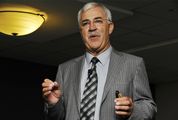BUSINESS AND THE NDP: People know Harambee gets you jobs
by Colin Anthony,
2014-11-20 07:01:32.0
IN SOWETO, the name Harambee is on people’s lips, says Grace Matebula, 26, who lives in Tshiawelo, Soweto. "I found out about Harambee through a friend who got a job through them," she says. "Then I got this job through Harambee and I know of 30 to 40 other people who also did. Now everyone’s saying: Harambee gets you jobs."
We sit at a table at Nando’s in Southgate Mall where Matebulo has been working as a cashier since April this year. The excitement is visible as she talks of the prospects the Nando’s job has opened up for her, which to her is as important as the job itself.
The job, she says, ensured her financial independence. Before, she worked weekends only for a marketing firm, promoting products in store and her brothers and sisters assisted her financially. "Now I’m independent, with this job I pay my own way and I can even afford to complete studying." She did her first year in 2012 of a human resources course at Johannesburg Central College but had to take a gap year for financial reasons.
"It’s more than just the job," she says. "I’m learning so much more than being a cashier — I’m now seeing how businesses work, from the inside. And not only here, I’ve visited head office and am seeing how HR does things".
Last month, the Harambee Youth Employment Accelerator programme hit 10,000 direct placements since starting operations in 2011 and has set itself a target of placing 10,000 a year.
It is a non-profit organisation, a partnership between the government’s Jobs Fund, investment company Yellowwoods and a range of private and public sector employers. Essentially, it takes matriculants with few skills and poor job prospects and trains them for a specific role.
The actual jobs are determined by the companies who tell Harambee they need someone for a certain role. "We are demand driven from employers — not random," says
Bryony Maxwell, Harambee’s head of marketing. "For example, If Transnet needs people in Kuruman, we send a team there to identify candidates." Candidates undergo assessments which show where their strengths lie. The target of placing 10,000 candidates a year does not faze Maxwell: demand from employers is high and growing. "We think the potential is enormous and we are considering opening 10 more centres. We have proven that the model works."
Nando’s has hired 1,411 candidates from the Harambee programme since its inception in 2011. Prior to that, says Peet Opperman, Nando’s inland regional manager, there were "massive inconsistencies" in terms of quality of people employed.
He says Nando’s now has zero vacancies. "We are employing motivated people with the potential to develop. Our labour turnover has also reduced which saves us in training costs and improves our product and service quality. It has beena game changer."

Picture: THINKSTOCK
IN SOWETO, the name Harambee is on people’s lips, says Grace Matebula, 26, who lives in Tshiawelo, Soweto. "I found out about Harambee through a friend who got a job through them," she says. "Then I got this job through Harambee and I know of 30 to 40 other people who also did. Now everyone’s saying: Harambee gets you jobs."
We sit at a table at Nando’s in Southgate Mall where Matebulo has been working as a cashier since April this year. The excitement is visible as she talks of the prospects the Nando’s job has opened up for her, which to her is as important as the job itself.
The job, she says, ensured her financial independence. Before, she worked weekends only for a marketing firm, promoting products in store and her brothers and sisters assisted her financially. "Now I’m independent, with this job I pay my own way and I can even afford to complete studying." She did her first year in 2012 of a human resources course at Johannesburg Central College but had to take a gap year for financial reasons.
"It’s more than just the job," she says. "I’m learning so much more than being a cashier — I’m now seeing how businesses work, from the inside. And not only here, I’ve visited head office and am seeing how HR does things".
Last month, the Harambee Youth Employment Accelerator programme hit 10,000 direct placements since starting operations in 2011 and has set itself a target of placing 10,000 a year.
It is a non-profit organisation, a partnership between the government’s Jobs Fund, investment company Yellowwoods and a range of private and public sector employers. Essentially, it takes matriculants with few skills and poor job prospects and trains them for a specific role.
The actual jobs are determined by the companies who tell Harambee they need someone for a certain role. "We are demand driven from employers — not random," says
Bryony Maxwell, Harambee’s head of marketing. "For example, If Transnet needs people in Kuruman, we send a team there to identify candidates." Candidates undergo assessments which show where their strengths lie. The target of placing 10,000 candidates a year does not faze Maxwell: demand from employers is high and growing. "We think the potential is enormous and we are considering opening 10 more centres. We have proven that the model works."
Nando’s has hired 1,411 candidates from the Harambee programme since its inception in 2011. Prior to that, says Peet Opperman, Nando’s inland regional manager, there were "massive inconsistencies" in terms of quality of people employed.
He says Nando’s now has zero vacancies. "We are employing motivated people with the potential to develop. Our labour turnover has also reduced which saves us in training costs and improves our product and service quality. It has beena game changer."




















Change: -0.47%
Change: -0.61%
Change: 0.53%
Change: -0.42%
Change: -2.12%
Data supplied by Profile Data
Change: -0.46%
Change: -0.19%
Change: -0.47%
Change: 0.00%
Change: -0.16%
Data supplied by Profile Data
Change: -1.11%
Change: -1.23%
Change: -0.78%
Change: -1.36%
Change: -1.24%
Data supplied by Profile Data
Change: 0.52%
Change: 1.35%
Change: 1.31%
Change: 0.18%
Change: 1.12%
Data supplied by Profile Data